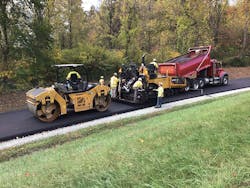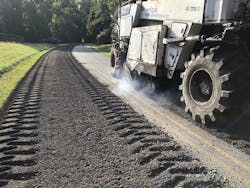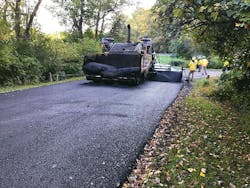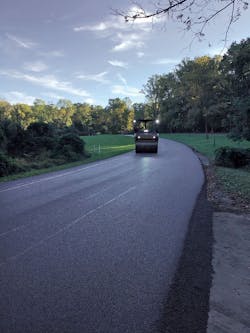PennDOT pilot tests asphalt, recycled plastic paving mixture and other alternative roadway treatments
By: Mike Keiser
In today’s world, it can seem like we always have a black-and-white choice between two desirable outcomes. In the past—for some parts of the transportation and infrastructure space—it seemed that choice existed between sustainability and efficiency.
But today, it is easier and increasingly more common for governments to find new, innovative ways to improve citizens’ lives and infrastructure—while stretching precious dollars—through innovations in materials and business practices.
And there is an additional environmental urgency as well, especially regarding waste plastics. According to the U.S. Environmental Protection Agency (EPA), landfills received nearly 27 million tons of plastic in 2018—18.5% of municipal solid waste that year. However, only 3 million tons (8.7%) were recycled in 2018. Plastic is difficult and expensive to recycle, and finding new ways to recycle and repurpose plastic waste will certainly have environmental benefits.
Testing recycled plastics
In response to the desire to recycle mixed waste plastics and in accordance with the Commonwealth’s sustainability goals, the Pennsylvania Department of Transportation’s (PennDOT) Strategic Recycling Program (SRP) focused efforts to identify opportunities to recycle large quantities of hard-to-recycle waste plastics in PennDOT improvement projects. After more than two years of research, testing, and collaborative planning, in October 2021, a demonstration project using an asphalt modifier manufactured with recycled plastics was used in a replacement pavement project in Ridley Creek State Park.
The pilot is a collaboration between PennDOT and the state Departments of Conservation and Natural Resources (DCNR), Environmental Protection (DEP), and General Services (DGS). Benefits of the pilot project include diverting waste plastics from landfills, helping to establish a market for recycled plastics, and extending the useful life of asphalt pavements.
This project and material being tested support interagency goals to increase the Commonwealth’s sustainability in operations. Potential benefits include:
- Extended useful life of asphalt pavements
- Reduction in maintenance needs
- Diverting waste plastics from landfills and helping to establish a viable market for these plastics
- Diminishing the petroleum binder used in asphalts
- Continued ability to reuse asphalt millings in future paving projects
While researching this new product and its potential applications, it became evident geography, climate, and road type should be considered. While the recycled plastic additive is appropriate for (and potentially beneficial to) designs on high-volume roadways and colder regions, a conservative approach was taken for this initial demonstration project.
Through coordination with DCNR, DGS, and PennDOT, Ridley Creek State Park in the southeastern region of Pennsylvania was attractive because it sees almost 1 million visitors a year, which is a considerable amount for a state park, but still considered a low volume road by PennDOT. Further, this location experiences fewer temperature extremes than the mountainous regions of the state. With lower temperature cracking being a potential concern, it was important to obtain measurable performance criteria that could be extrapolated to other uses without affecting state assets.
The first quarter-mile test section was placed at the park entrance to experience the highest vehicle loading and the second quarter-mile section was placed at the end of the park to monitor climate factors separately. Future project locations will expand on the knowledge gained here and contain higher vehicle loads along with colder climates.
The SRP’s technical team led the research, planning, and coordination for this demonstration project that includes five years of performance monitoring and reporting to stakeholders and the public.
The project includes two quarter-mile sections where the recycled plastic asphalt modifier was used as a 2% additive to the binder in the road’s wearing course. While this does not seem like a lot, this equates to approximately 150,000 single-use plastic bags. According to the EPA, plastic containers and packaging made up over 14.5 million tons of municipal solid waste in the U.S. in 2018.
In addition to recycled plastic, this full-depth reclamation project also employed recycling of the existing road/base material, and approximately 30% of the new asphalt pavement contained recycled millings.
The sections paved with the plastic asphalt modifier will be compared to adjacent sections that were paved using a conventional asphalt blend. Since this material is new to PennDOT and most DOTs in the U.S., during the completion of this project, both the contractor (Allan Myers Inc.) and the manufacturer of the recycled plastic modifier (NVI Advanced Materials Group) performed supplementary evaluation and planning efforts when requested by PennDOT or DCNR. Ultimately this particular recycled plastic asphalt modifier was chosen because it is easily stored, handled, and easily added to the pavement at the asphalt plant. Additionally, it readily and completely melts within the asphalt bitumen binder at conventional asphalt temperatures and does not require specialized equipment at the plant. Other state DOTs have reported successful pilots of this type of product, and moreover, laboratory testing shows the asphalt modifier helps bind other deleterious materials within the asphalt mix.
Because this is a pilot project to determine the feasibility of this process for more widespread use by the department and others, evaluation of the sample section will be a critical component. Over the next five years, PennDOT’s SRP team will monitor the technical performance and conduct evaluations of microplastics release. The team will also monitor the wearing of the pavement with respect to cracking and rutting, and comparing it against the control section and PennDOT standards, as well as collecting storm-water samples for third-party laboratory analysis of microplastics.
An overview video of the Ridley Creek State Park paving project uses drone footage captured during and after construction. The expected environmental and performance benefits gained through use of the recycled plastic asphalt modifier are summarized, and the participants in this multiple state agency demonstration program are acknowledged.
More opportunities for recycling materials
Other innovative uses for recycled materials and alternative roadway treatments are being investigated by the SRP and becoming more common at PennDOT, as well as more accessible to local governments in Pennsylvania. These treatments have been a key component of the department’s Road Maintenance and Preservation (Road MaP) program, which was announced in 2017 and is partially focused on improving lower-traffic roadways. From the 2018 state fiscal year through the end of June 2021, the department has saved $42 million and completed 604.65 miles of secondary road improvements using alternative treatments. That is 247 more miles than could have been completed using traditional treatments.
These treatments include cold recycled asphalt paving (RAP) either by central plant mix or by cold-in-place, higher RAP mixes of warm mix asphalts, and flexible base (FB) paving. Central plant mix RAP paving is completed by generating the material through a pug mill and hauling it to a paver for placement, whereas cold-in-place is the process of milling off the existing asphalt surface, mixing it with a liquid bituminous oil, and placing it with a paver directly back on the roadway. A deciding factor on which RAP application to use is the current pavement structure of the roadway.
The use of high RAP mixes in warm mix asphalt is relatively new, but a growing trend through the department. The department and industry partners worked together to develop a new, higher-RAP-content 19-mm (binder) asphalt for use on low-volume roads. This material allows for up to 50% RAP content with an approved job mix formula from the vendor. The goal was to create a material that would perform on low-volume roads and provide a considerable cost savings to the department. Currently PennDOT and the industry are working to expand high RAP mixes to include a 25-mm (base) course and a 9.5-mm (wearing) course.
Another treatment, flexible base (FB) paving, is a process that has been around for decades and still used in some municipalities. The department is using FB material by mixing virgin aggregate with a liquid bituminous oil and placing it through a paver on the roadways. The FB materials perform well on low-volume roads and—due to their flexible properties—perform well with Pennsylvania’s freeze-thaw cycles.
In addition to their use at the department, PennDOT also encourages municipalities to consider the use of recycled materials and alternative treatments to stretch their limited funding resources. PennDOT’s Publication 447 discusses low-cost treatments and approved products for lower-volume local roads in Pennsylvania.
Transportation planners should not have to choose between environmental sustainability and effectiveness when caring for infrastructure. PennDOT is proud to be a DOT at the forefront of innovative practices that have the potential to transform the way the department does business, and to work with fellow Commonwealth agencies to implement them.
About The Author: Keiser is Acting Deputy Secretary for Highway Administration with the Pennsylvania Department of Transportation.



